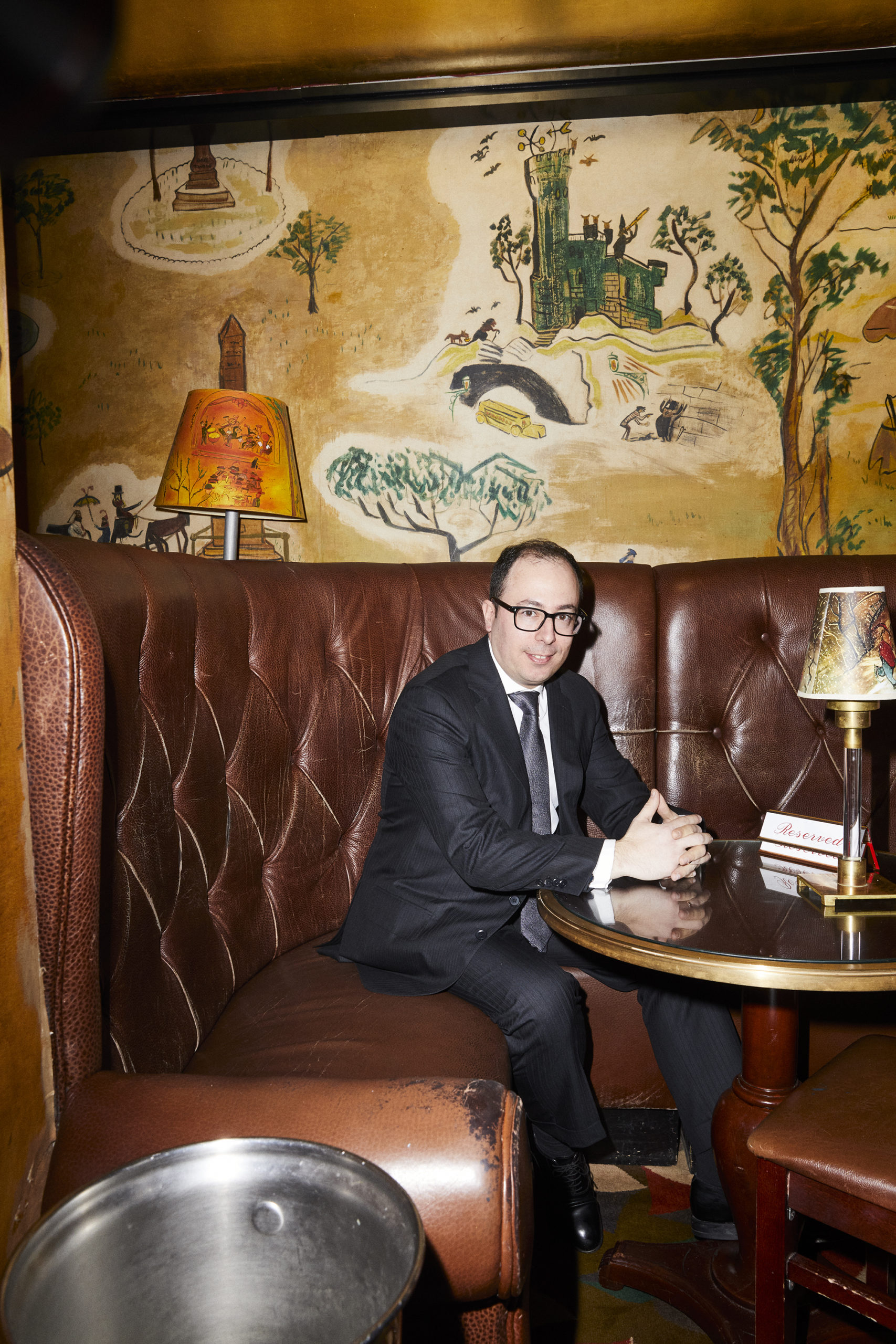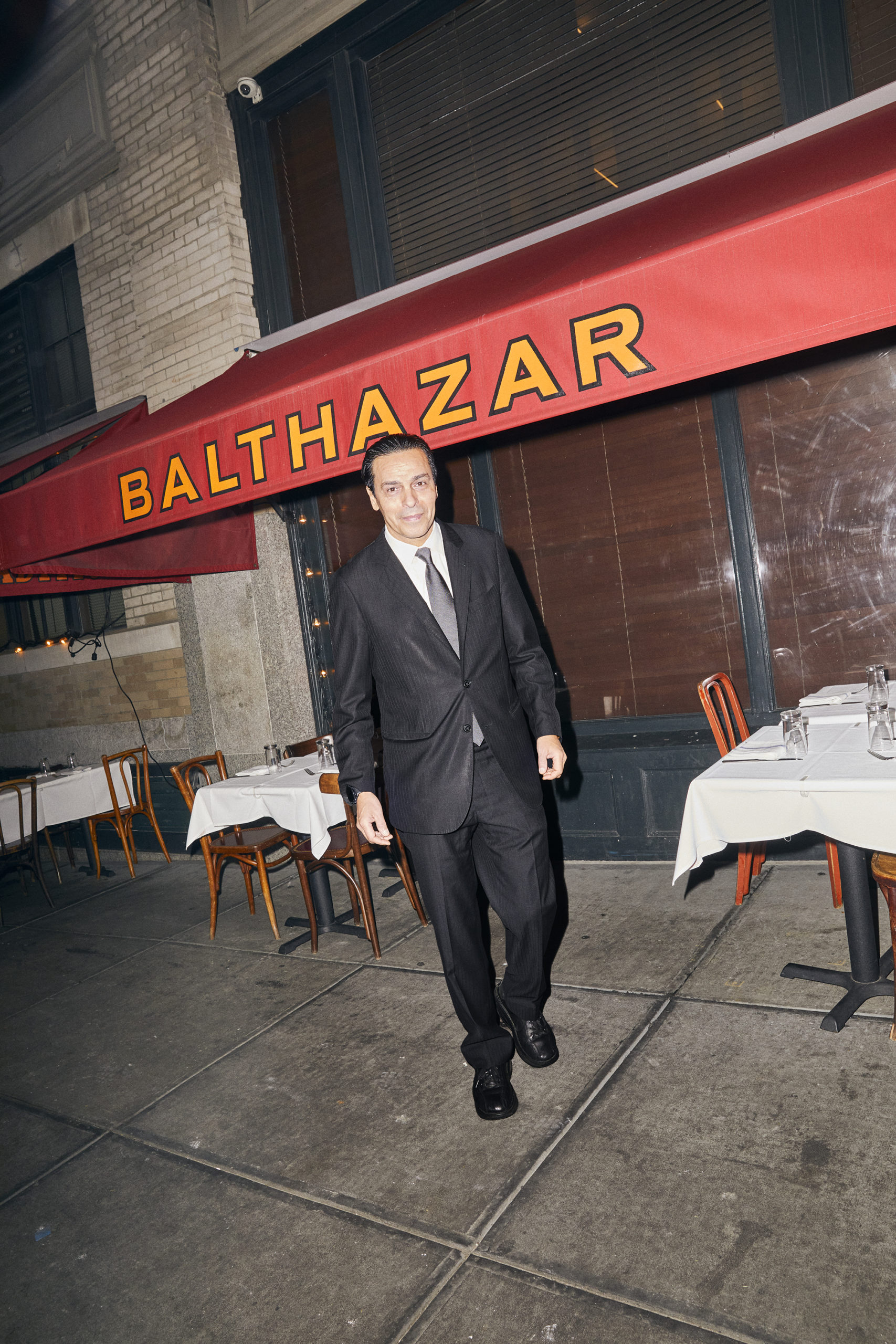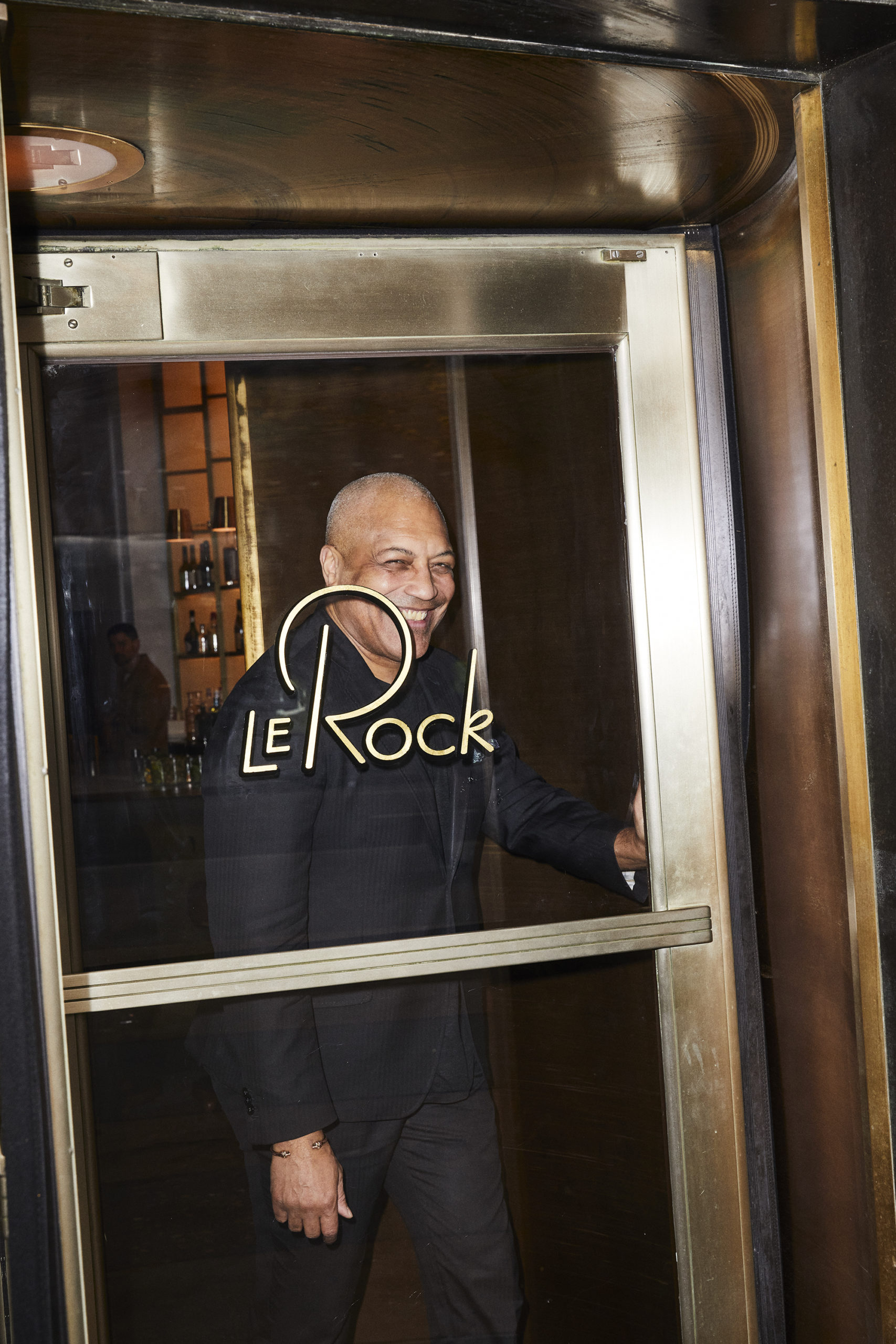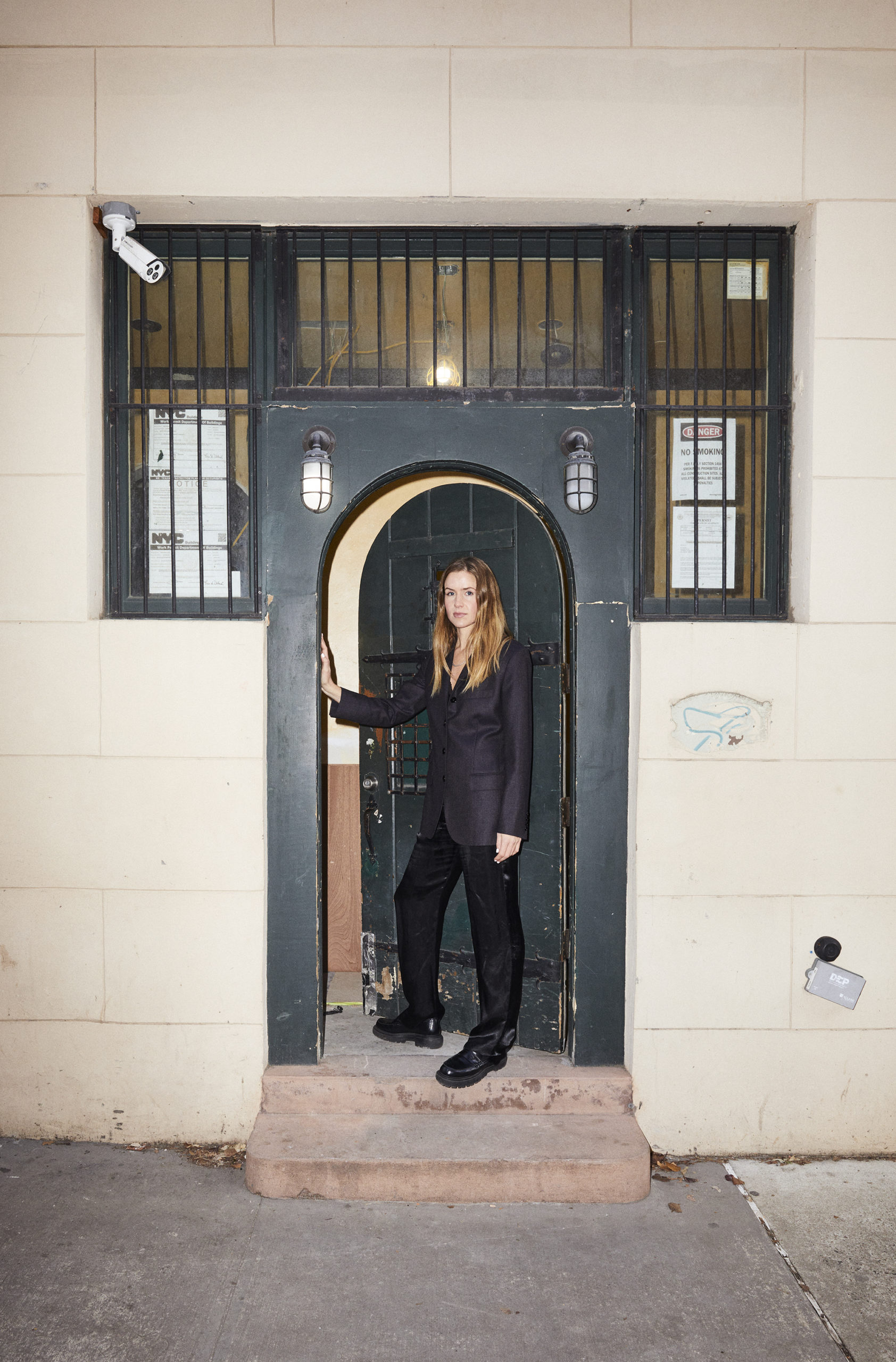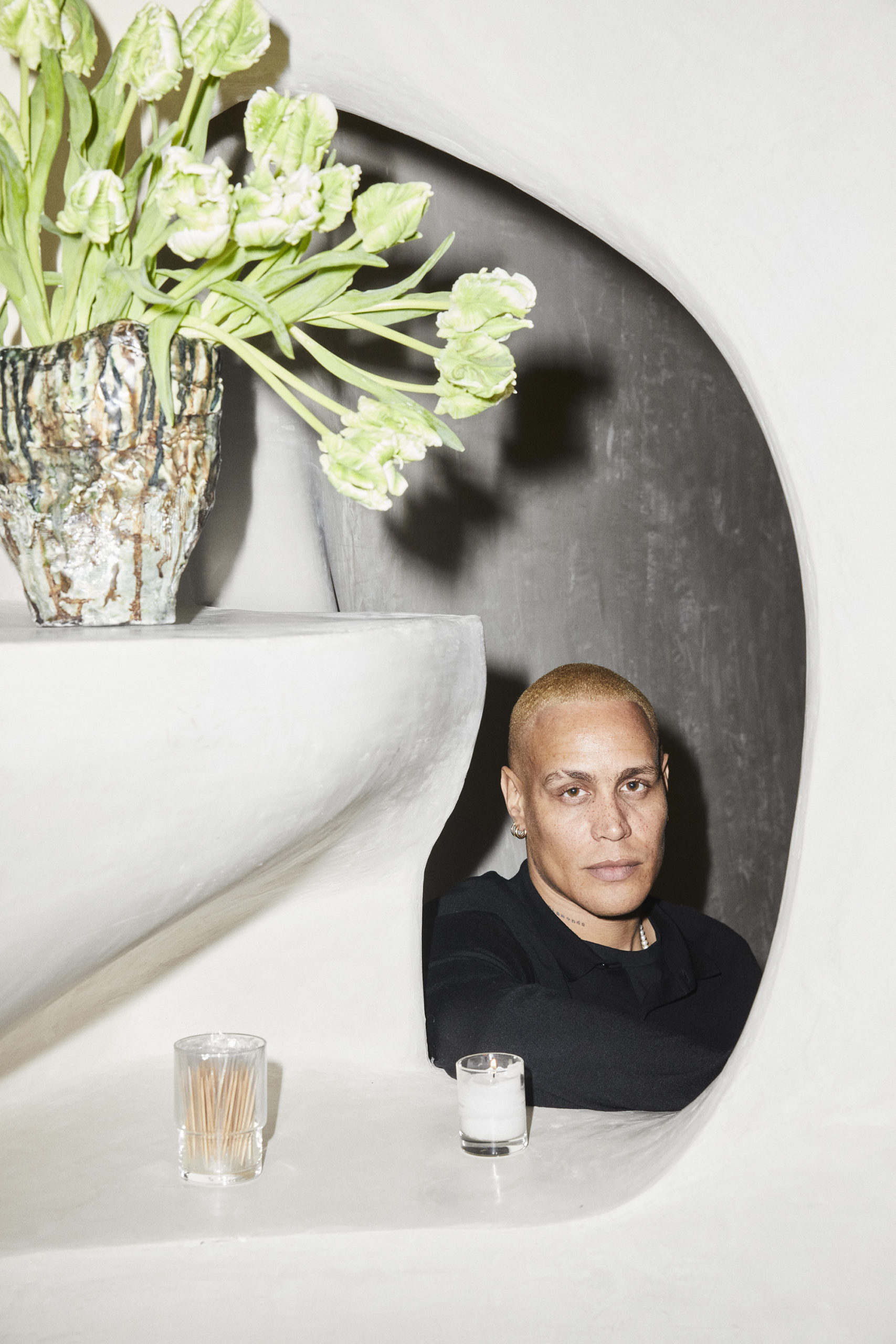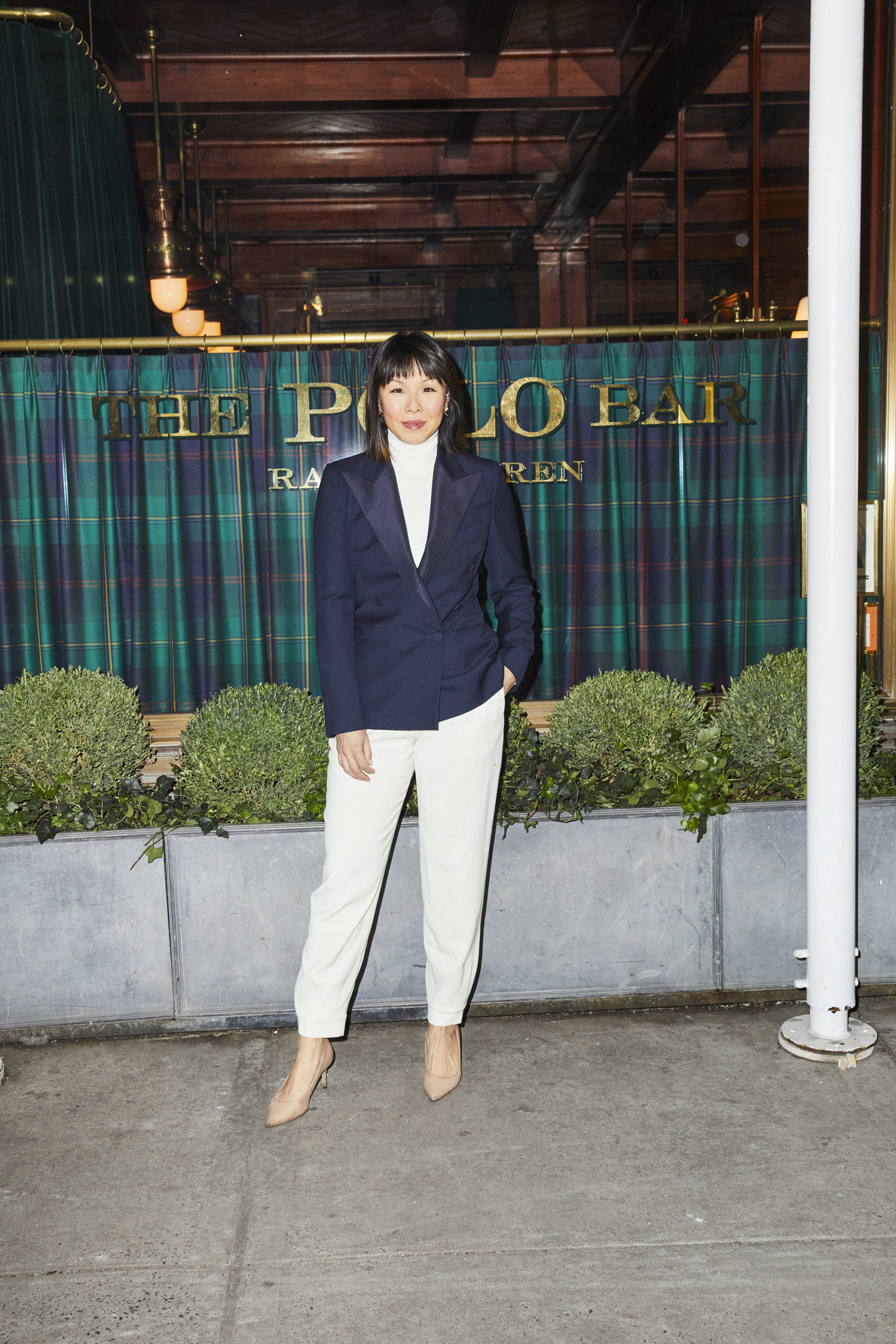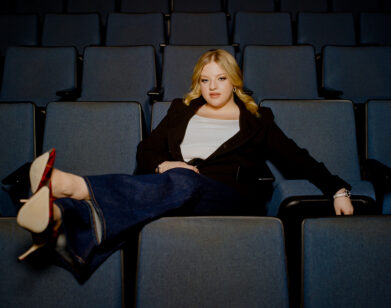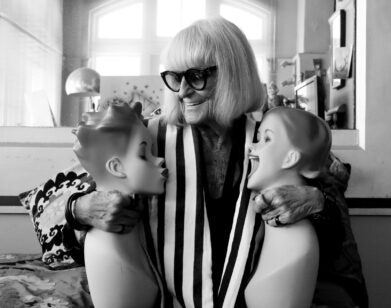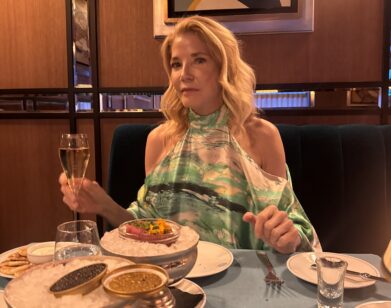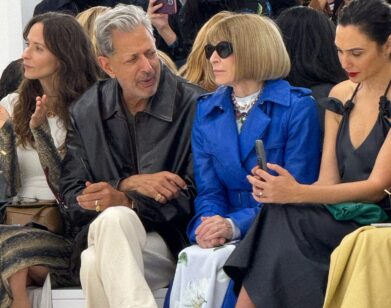HOSTING
The Gatekeepers of New York’s Most Coveted Tables Tell All
Meet the gatekeepers of New York City’s most coveted restaurants.
———
DIMITRIOS MICHALOPOULOS
Bemelmans Bar at The Carlyle, Upper East Side
FOSTER KAMER: Bemelmans has been around since 1947. It’s been an uptown-crowd hangout, a fashion-crowd hangout, and then, shortly after the pandemic, TikTok discovered it. What’s the crowd like these days?
DIMITRIOS MICHALOPOULOS: It’s a fine balance, honestly. We have our regular guests. They keep coming every day, for all these years. And we also have, you know, a younger crowd.
KAMER: The TikTok crowd?
MICHALOPOULOS: I’m not very familiar with TikTok, but I’ve heard some of the conversations around it.
KAMER: How do you honor your regulars while also allowing for fresh blood in the room?
MICHALOPOULOS: Usually, regulars are staying at the hotel, or we just know them—everybody knows them. We can’t reject people that have been coming here for more than 15 or 20 years. We appreciate that they’ve been loyal. Also, we don’t want to disappoint our new crowd. So we try to balance it out and keep it moving, on both sides.
KAMER: You guys have some pretty wild yearly nights. For example, you’re host to both a Met Gala pre-party and the Tony Awards after-party. Which crowd do you like more?
MICHALOPOULOS: Tony Awards. A little bit more eccentric. [Laughs] And hyped. I’ve had people climbing on the banquettes, people lying on the piano.
KAMER: What are some of your favorite moments working at Bemelmans?
MICHALOPOULOS: When I see guests like Paul McCartney at the bar on a random Monday night. And how he feels comfortable to say to his waiter, “I’m going to have my usual.” And we all know what the usual is [a margarita, with orange juice]. And then he’ll go talk with [legendary Bemelmans pianist] Earl Rose. Everybody is so respectful of the fact that they’re seeing him in the bar— they take pride in being there. It’s an ambiance that’s kind of magical.
KAMER: I’ve never seen any really wild behavior there.
MICHALOPOULOS: You have to come a little bit later next time. Those martinis are 5 ounces, straight booze.
KAMER: Sounds like you’ve seen some wild behavior.
MICHALOPOULOS: Look, you have to be trained to be able to cope with these kinds of things. We try to check for signs of intoxication.
KAMER: So when are people getting the most tanked there?
MICHALOPOULOS: During the holidays, we see an increase in certain kinds of situations. Especially in New York City, there are a lot of people suffering from depression. During the holidays, things are getting a little bit more intense. And alcohol isn’t helping.
KAMER: What are the best nights to go?
MICHALOPOULOS: This is like if you asked me which table is the best table. They’re all the best.
KAMER: If you’re going out on a day off, where does the guy who runs the room at Bemelmans go out to drink?
MICHALOPOULOS: It’d be the Cafe Carlyle.
KAMER: Come on, man.
MICHALOPOULOS: I’m a Carlyle junkie! Honestly, I’ll go anywhere just to have fun, but if I had to go to the “best” place? That’d be Bemelmans. I swear.
KAMER: You swear?
MICHALOPOULOS: I know this bar better than my house. Believe me.
———
ZOUHEIR LOUHAICHY
Balthazar, SoHo
FOSTER KAMER: So, and I’m speaking a little poetically here, but what’s the difference between a mere host and a maître d’?
ZOUHEIR LOUHAICHY: You’re responsible for the whole dining room. Maître d’ is short for maître d’hôtel, “master of the house.”
KAMER: There’s an art to it.
LOUHAICHY: You’re responsible for everything. The atmosphere, the cleanliness, and the organization of it all. You’re responsible for that space. And keeping it busy, filled, and filling it the right way. There’s so much thought within all of it. A lot of that comes from Keith [McNally, Balthazar’s owner] too.
KAMER: Keith was a filmmaker. He’s hell-bent on mise-en-scène.
LOUHAICHY: And a busboy, and a bartender, and a maître d’. He knows how these roles should work.
KAMER: What does a small example of the Keith/Zouheir standard of running a room look like when it’s applied, and working well?
LOUHAICHY: Well, for instance, you’re not going to seat two single diners next to each other, not going to have a section of all men sitting next to each other, or all women. You have to mix it up. You have to create a nice, fun atmosphere. One of the best things, for us, sometimes you turn around, and people you sat next to each other that didn’t know each other before, they’ve become friends and go out to a bar after dinner.
KAMER: That’s the McNally Magic.
LOUHAICHY: One of the hardest things about doing a job like this for a long time is ensuring that the level of quality stays high. A lot of places stop maintaining the standards that got them there. They get too popular for their own good.
KAMER: And then they’re winging it. And then, it’s curtains.
LOUHAICHY: I’ve been doing this for 25 years. There’s no winging it.
KAMER: But one thing that has changed over those 25 years is Keith got on Instagram. And he’s publishing your nightly reports. I’m still not sure how much of those are you versus his, uh, embellishing—
LOUHAICHY: They’re 98 percent true.
KAMER: Come on, really?
LOUHAICHY: He adds a tiny little twist on it here or there, sure. But the report is the report.
KAMER: Granted, it was a lifetime ago that I worked for Keith taking reservations, but I didn’t imagine in my wildest dreams that he’d be publishing nightly reports and VIP statuses on social media. That’s had to change things for you, right?
LOUHAICHY: So, here’s the thing: Yes.
KAMER: [Laughs]
LOUHAICHY: Now people read the reports, and in them, you can see who’s double-A, who’s triple-A. And now there are people who are like, “Why am I just double-A?” And I have to tell them, “Because only Keith can make you a triple-A.”
KAMER: I remembered the triple-A list by heart: Bono, Anna, Bill, etc. Mostly one-namers.
LOUHAICHY: But really, Keith is a genius restaurateur. He’s always ahead of the curve. And sometimes, he goes by his intuition. But what ended up happening is, people love these reports. With a passion.
KAMER: They’re some of the best press the restaurant’s ever had.
LOUHAICHY: And also, it gives people a glimpse of what truly happens at the restaurant. We don’t make this stuff up.
KAMER: Speaking of press, another thing I can’t imagine working through was the James Corden incident. What was that week like?
LOUHAICHY: Well, that was a brunch, and I don’t work brunches, so I wasn’t there. But I was dealing with people’s reactions at the restaurant, people wanting to know more, the press, and so on. I could write a book of what I heard from people in just that week. And then the story kept going. James Corden saying, “I never did anything wrong.” Are you kidding me? The poor server needs therapy now, and you tell me you didn’t do anything? And she’s one of the loveliest servers we have! It’s unfortunate. We meet a lot of celebrities and the majority of them are nice people.
KAMER: Back in the day, we had a code in the office for people who were assholes on the phone lines. PAB, punk ass bitch. I don’t know if that’s still the code.
LOUHAICHY: We have HWC. Handle with care. [Laughs]
KAMER: You started at Balthazar in 1997, when it opened. Running the room there might be the apotheosis of this job. It’s dancing Balanchine at Lincoln Center. What do you think is intrinsic to your character that renders you right for this job?
LOUHAICHY: I go back to my Moroccan culture—it’s how I grew up. Moroccans are known for being great hosts, it’s just in your conscience. It’s, “Whatever you have, you can share. My home is your home. If this can sleep three, it can sleep five.” That’s always been a big part of my life.
KAMER: And beyond that, what makes other people good at this job?
LOUHAICHY: You have a lot of patience. Also, never, ever, be surprised by anything. Like, ever. Anything that could possibly happen, it’ll happen. And that’s one of the wonderful things about working in a place like this. Any shift is its own unique world, unlike any other shift I’ve ever worked in my life.
———
KEVIN KING
Le Rock, Rockefeller Center
FOSTER KAMER: You’ve been doing this for a long time, including a legendary tour of duty at Balthazar. Now you’re at Le Rock, which is one of the most critically acclaimed restaurants in the city and not just in Midtown, but in Rockefeller Center. Coming from a life downtown, what’s the change in barometric pressure like up there for you? How different is it?
KEVIN KING: I thought it was going to be different, and it’s not. I walk into this room, and there are still so many people I know that I’ve met from my time downtown. And mind you, I’ve never worked above 7th Street in my life. [Laughs]
KAMER: Yeah, but it’s Midtown.
KING: Just look at the menu. We didn’t come to Midtown to open a steakhouse. We opened a three-star brasserie with an all-natural wine list.
KAMER: Fair.
KING: We’re getting people from everywhere. There’s no Midtown-downtown separation. The only way it’s different is the bar crowd and the time that people come. Downtown, everybody wants to get a 7, 7:30, 8 o’clock table. People here are dying to get a 6 o’clock.
KAMER: Okay, so that is different.
KING: To me? Sure. When I came to Le Rock, I thought it was gonna be an all-business crowd. It’s not. With technology, when it comes to restaurants, you have Instagram, you have all of the online presence that didn’t exist 20 years ago. So, if a restaurant’s hot, people are going to hear about it, and they’re going to come. Twenty years ago restaurants took a lot longer to build a “hot” reputation.
KAMER: What else has technology changed for the maître d’ of today?
KING: What is being lost is the art. A lot of the people in your story, we come from a time before there were screens, before there was Resy. That made us so much better at the job. It was about interacting with people, not just reading something off of a screen.
KAMER: It’s true. At Chez Georges in Paris, they’ve got this reservation book sitting on the counter when you walk in, it’s gotta be about a foot thick, at least 2 feet in length. I’m pretty sure it’s the same one they used since they opened in 1926. They knew nearly every person that walked in.
KING: I knew a couple, working at one restaurant, they had their first date on table 24. So, guess what? Every time they came into that restaurant, I made sure that table 24 was theirs.
KAMER: There’s a magic to that.
KING: There’s nothing I hate to see more than when you walk into a restaurant, and there’s someone staring at a screen, because they’re not actually interacting with you.
KAMER: The art gets lost. And then it’s just whatever’s on Resy, and the people trying to palm you.
KING: This is something I’m very adamant about. No one can ever walk into a restaurant where I’m standing and give me money for a table, and that’s probably across the board with everyone who has worked for Keith [McNally].
KAMER: It’s true. They all said they won’t take a palm, that they’ll only accept a tip.
KING: If someone is leaving the restaurant, and they want to say thank you so much for taking care of me—I know you asked, in your email, what’s the most I’ve ever been palmed.
KAMER: Let’s hear it.
KING: Upon leaving a restaurant? $1,000. Do I want that published? I don’t think so. One time I remember standing at the podium, and no bullshit, this guy walks in at 11 o’clock, and literally pulls out $10,000. He says, “I want to spend this, here, today.” He proceeded to buy every single person in the restaurant a drink, and then sat down and he’s like, “I want your most expensive bottle of wine. What’s your most expensive bottle of white, and your most expensive bottle of red?” Literally $10,000 in cash. Maybe we laundered a bunch of money for him that day.
KAMER: No question. What else, when you’re passing down the art of doing this, are you telling people? How are you training them?
KING: The first thing is, be happy that people want to be here. And then, stop and listen to what they’re asking for. If you treat every single person like you want to be treated when you walk in a restaurant, you really can’t fuck this up.
———
CHARLOTTE LANSBURY
Froggy’s, West Village
FOSTER KAMER: You’ve done your time in New York, opening up MIMI. You helped open Horses, one of the hottest L.A. restaurants in years. Now you’re coming back to New York to open Froggy’s with the Horses team. What are the major differences between running a room in these two cities? From your vantage, what are the differences between the two crowds?
CHARLOTTE LANSBURY: To live in L.A. is to set an intention every time you leave the house. There’s more planning involved, less spontaneity. For a restaurant, it means we can probably have a better sense of the flow of the night.
KAMER: But in New York?
LANSBURY: You never know where you’re gonna end up. You should probably wear comfortable shoes. There’s always that sense that you could snap your fingers and be somewhere else. As a restaurant in New York, you need to have more of a sense of fluidity and flexibility. People are sitting somewhere, they’re having a nice time, and suddenly, they want friends to drop in. You can’t plan as much for the night.
KAMER: Which crowd is better?
LANSBURY: I would say, in Los Angeles, the conversations are perhaps less interesting. [Laughs]
KAMER: Go on.
LANSBURY: There’s an overall sense of, “I’m doing well, and I’m going to prove it to you,” as far as conversation is concerned.
KAMER: Whereas in New York?
LANSBURY: There’s a self-deprecating “everything sucks” attitude, which is more endearing to me because it’s more honest. That’s more my nature. It’s a lot more interesting than so many nights in L.A., just going around and saying, “Hi! How are you?!”
KAMER: There’s less substance there. And L.A.’s restaurant crowd, especially at hotter places, trends younger.
LANSBURY: The millennial restaurant-goer, in general, is very annoying.
KAMER: To say the least.
LANSBURY: It was in New York that I first discovered this, so I wouldn’t say it’s a New York vs. L.A. thing, but it’s this idea that you’re going to a restaurant to have an opinion about it and say you’ve been there. It’s like people who talk about traveling, and say, “I did Spain.” It’s so obnoxious. Like you checked a box. It’s more on weekends where we get that.
KAMER: They’re not there for the experience of eating at a restaurant as much as for—
LANSBURY: Their bucket list. They come in, look at whatever pictures people post the most, and that’s what they’re going to order. They’re going to split a salad and a burger and have two cocktails, and they’re going to be able to tell everyone how it was, and they’ll never come back, even if it was pretty good.
KAMER: The TikTok effect.
LANSBURY: That’s what having a camera attached to your arm does. But in L.A., you have this “health goth” thing, which is so alive and well. They’re caricatures of themselves, truly.
KAMER: Now we’re talking.
LANSBURY: The other night, this girl—and I don’t partake, I’m sober now—but this girl I know, I was at a thing where she had a plate of coke in front of her—
KAMER: And she was talking about not eating red meat?
LANSBURY: No, she said, “I meditated today.” It had nothing to do with what she was about to do. That was just their conversation. They were talking about meditation. [Laughs]
KAMER: And yet, in spite of that, Horses had one of the most diverse crowds of any L.A. restaurant I’ve been to in a while. [L.A. Clippers coach] Doc Rivers and an influencer table notwithstanding, it was one of the most downtown New York crowds I’ve ever seen in L.A. How will you build that quality of crowd at Froggy’s? Or rather, how’d you do it in L.A.?
LANSBURY: It was really organic. We didn’t do a big PR push. That can only do so much. We had two weeks of friends and family, literal friends and family of our staff, some people in media, and some industry folks. Then, I sort of treated the place like it was my dinner party: A lot of people in creative fields, a lot of fellow recovering New Yorkers. No one who’s going to come in and be high maintenance. It’s mostly just people with a joie de vivre.
———
QUENTIN BELT
Casino, Dimes Square
FOSTER KAMER: Let’s say it’s the start of a night, and you’re gearing up for service. From the top, what’s your approach?
QUENTIN BELT: First, I’ve already googled every single guest.
KAMER: Come on. It’s standard practice in fine dining, but down here?
BELT: Every single guest. I mark them if they’re industry. I mark any publication someone’s connected to. And then, any names I recognize. Look, everybody is special. But in New York? Everybody is “special.” You know what I mean? Everybody’s got their head in the clouds a little bit.
KAMER: What do you do when everybody is “special”?
BELT: Make them feel like whatever I have available for them is the most special thing in the world. If it’s bar seating, if it’s sitting in the cafe, if it’s an hour-long wait, I’m like, “I got you. My goodness I’m really putting myself out here for you, but I got you.” It’s all about being as nice as you can.
KAMER: What’s the diplomatic maneuver when someone gets upset that you sat them in Siberia?
BELT: The party isn’t the atmosphere. You are the atmosphere. You are the party, right? You should be able to sit anywhere in this restaurant and have a good time.
KAMER: But you map the room, right? Or do you have that “everybody goes everywhere” mentality?
BELT: Oh, no. If you’re a VIP, you’re getting a booth. If I see you, and from your outfit, I can tell that you’re an Instagram “I’m gonna be taking pictures in here” type, I’m giving you the best lighting.
KAMER: You can see those a mile away.
BELT: A mile away.
KAMER: What’s the most anyone’s tried to palm you?
BELT: When I worked at Mission Chinese, people sent me clothes. They’re like, “Oh, you like these pants? I would love to send you some.” The most I’ve ever been palmed was $200. Recently, at The Turk’s Inn [in Bushwick], somebody palmed me $100.
KAMER: What?
BELT: For a table I already had available.
KAMER: I was gonna say, I didn’t think Turk’s Inn was popping like that.
BELT: It was just someone who was high signing, trying to show off to the ladies. I totally respect that.
KAMER: Definitely better than someone trying to flex on you without cash.
BELT: I’ve had a lot of people do the, “Do you know who I am?” And I used to be much snarkier, much meaner. People would come into Mission Chinese, and be like, “I need a table for six in the next 20 minutes.” In September! I’d be like, “Uh, I could do sometime in the spring, if you want to come back then.”
KAMER: Also, anyone who pulls “do you know who I am,” without fail, they’re typically a nobody.
BELT: Exactly. But with that being said, especially in this neighborhood, especially being a Black gay man, I do want everyone to feel seen. And I do want this dining room to look diverse.
KAMER: It’s pretty well established that restaurants have a huge inclusivity problem. There’s an institutionalized force at work there that goes beyond the host stand. But it can also start—and end—at the host stand.
BELT: I hate talking about this, because I sound militant, but in the world of service, a beautiful white woman can say the same things that I’m saying, but she doesn’t have an attitude. White people, in my opinion, don’t like to hear “no” from a minority. And it’s subconscious! They’re not racist, they’re just not used to it. They’re not used to hearing, “Unfortunately, I can’t accommodate that,” from someone like me.
———
CHEUTINE FONG
The Polo Bar, Midtown
FOSTER KAMER: You have arguably got the tightest door on this list. Let’s say I’m just somebody who really wants to go to Polo Bar—no status, nothing to the house. How do I get in?
CHEUTINE FONG: If you came in here, and we were booked, and you were like, “I just want to have a drink”—I let in tons of people if we have the space. But people will come by, not get a table, and go, “Can’t I just come by tomorrow?” If you’re staying across the street at St. Regis, or somewhere around the corner, maybe come by, but I would not come in from Yonkers, just to check. That would just lead to disappointment. We, as a team, want to manage people’s expectations, but also give them hope that yeah, we do take some walk-ins, if there’s room.
KAMER: If you were to distill it to its essence, what do you do all day?
FONG: It’s like playing Tetris. I’m trying to figure out tables, maximizing, optimizing, and making sure everyone is happy.
KAMER: Emotional Tetris. Intuitive Tetris.
FONG: Absolutely. You have to have good intuition.
KAMER: I’m nearly done chasing all of you people down. I’m also becoming convinced that experience working at Balthazar, for Keith [McNally], is the Harvard—or maybe West Point—of hospitality.
FONG: It’s just such a special place. I don’t know how much of a historian you are on Keith, but before his restaurant days, his dad was a taxi driver in London. He was significantly older in his life before he’d gone to a nice restaurant. He was shy, and he was intimidated by these things that he creates, such grandiose places.
KAMER: It really is a fascinating origin story, coming from a working class background and opening these places known for the elite.
FONG: We’d have these host meetings, and Keith would always make the point, “There are going to be people pushing their way to the front of the line to the podium. And then, there are gonna be people who come in, who are going to be intimidated because of the grandiose nature of how big and bustling Balthazar is. But I want us to go to the back of the line and help those people, who don’t feel like they belong here.” That really stuck with me.
KAMER: People might be surprised to find out that most of the people working at MD stands or podiums around the city are not these power-hungry maniacs trying to wield status and class like a cudgel. Most of them would rather seat the really nice “nobody” over the A-list celebrity.
FONG: Yes. One time, I was working brunch, and there was a lovely family from Scotland that came in. You can tell they’re tourists, and I was like, “It’s a two-hour wait.” I felt so ridiculous saying that, but it just was that long.
KAMER: Yeah, I don’t miss working brunch. Or going to it.
FONG: But intuitively, I saw one of the cafe booths across from the bar and I was like, “I don’t care: I’m just going to get that family in.” I left the podium, literally ran down Spring Street and caught them on the corner of Spring and Broadway. I’m out of breath, just, like, “I can get you seated in just five minutes.”
KAMER: That’s rad.
FONG: It made me so happy to be able to do that because you could see, just moments before, they were so deflated. And then, their faces lit up when I told them. It’s not just a business.
KAMER: You’re dealing with emotions, expectations, hopes, pleasure, and memories.
FONG: It’s not just turning the tables. Most people say, “Oh, you’re the maître d’, you’re essentially the gatekeeper.” I don’t ever look at this like I’m in a power role. I look at this like, “How can I help people get in?”

